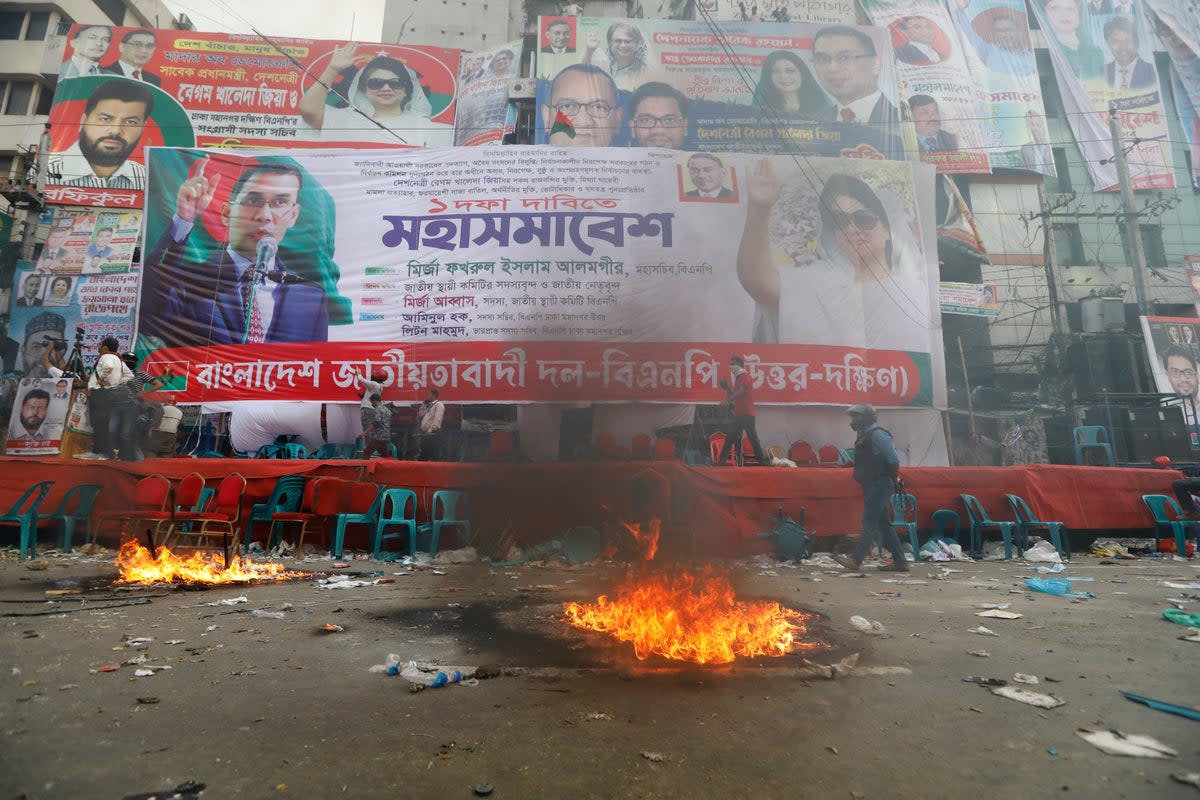Bangladesh’s political turmoil continues as main opposition party threatens to boycott elections

One of Bangladesh’s main opposition parties could boycott upcoming national elections if the current prime minister Sheikh Hasina does not resign.
A warning for the boycott has come from a leader of the Bangladesh Nationalist Party (BNP) as political protests in the country have turned violent.
The BNP leader said Ms Hasina should step down as Bangladesh’s prime minister and allow a neutral, caretaker government to take her place so it could conduct the upcoming polls in January next year in a fair manner.
The ruling Awami League party, under Ms Hasina’s leadership, has been in power in Bangladesh since 2009. She has been accused of human rights abuses and corruption.
“BNP and the opposition political parties will not go to a fake election,” Abdul Moyeen Khan, a former minister and member of the BNP’s highest policy-making body, told Reuters on Wednesday.
“We will not legitimise a fake election this government intends to conduct by participating in it.”
Earlier this year, BNP’s secretary general Mirza Fakhrul Islam Alamgir said there was no scope of “having any fair election under this government”.
“Every important institution of the country has been destroyed and people’s rights have been taken away. Price hikes of every essential have made people’s lives miserable,” Mr Alamgir said. On Sunday, he was taken into custody.
The BNP on the same day announced a three-day blockade of the country’s highways, railways and waterways, starting on Tuesday.
The widespread protests have led to instances of violence in which people have died.
On Wednesday, the second day of the blockade, a bus was set on fire by protesters in front of a school in national capital Dhaka. Police made an arrest in connection with the violence and local media said another suspect was still at large by the afternoon.
A day earlier, three people were reportedly killed during clashes between police and BNP supporters.
On 28 October, at least 11 people, including two police officers, were killed, and hundreds were injured.
Both the Awami League and the BNP have, however, denied their involvement in the violence.
Authorities blamed the violence on the BNP, while the party alleged the Awami League’s workers infiltrated one of its gatherings to incite violence and undermine what they assert was a peaceful movement.
The Daily Star newspaper in Bangladesh reported that the BNP also sent a seven-page letter to embassies and high commissions in Dhaka in an attempt to disentangle itself from the violence that occurred during a huge rally on Saturday.
The report said the BNP’s leaders are now collecting video footage to analyse who was behind the attacks on Saturday’s rally.
The BNP has opposed Ms Hasina’s plans for running in the January elections. As the country’s economic crisis worsens amid rising inflation and a cost-of-living crisis, Ms Hasina, observers said, needs to come up with a solution soon.
Human rights agencies have accused Bangladesh police of “unnecessary use of force” during recent demonstrations.
“Many Bangladeshis say they fear an escalation in violence as the government continues to crack down on the opposition’s right to participate and vote in the elections,” said Meenakshi Ganguly, deputy Asia director at Human Rights Watch, in a statement on Wednesday.
“Bangladesh’s international partners should insist that elections cannot be considered fair when the opposition is targeted, harassed and behind bars.”
She insisted that “international partners should make clear that they will not continue business as usual with Bangladesh as authorities carry out election abuses”.
Violence erupts in #Bangladesh amid demands for fair election. Authorities ignore international calls for restraint, target political opposition with mass arrests @hrw
https://t.co/RwsAIx2fGu pic.twitter.com/FOT929Mozi— meenakshi ganguly (@meeganguly) November 1, 2023
“They should condemn the mass arrests and targeting of the opposition and lay out consequences for trade and diplomatic ties if Bangladesh fails to backtrack on its abuses,” she said.
The UK’s high commissioner Sarah Cooke met Awami League member and former minister Faruk Khan and the party’s international affairs secretary Shammi Ahmed on Tuesday.
She urged all parties to work together and create an environment for “free, fair, participatory and peaceful elections”.
A spokesperson for the US State Department, Matthew Miller, said on Tuesday that Washington was in dialogue with several stakeholders in the country.
“We do believe that dialogue is important to achieving those goals. And what we want in Bangladesh is the same thing the Bangladeshi people want, which are free and fair elections conducted in a peaceful manner,” he told reporters.
In September, the US said it would “impose visa restrictions on Bangladeshi individuals responsible for, or complicit in, undermining the democratic election process in Bangladesh”.
The UN’s Office of the High Commissioner for Human Rights called on “all political actors to make clear that such violence is unacceptable and to avoid any statements or actions that could constitute incitement to violence” as the country heads towards elections.
On 26 October, BNP leader Ruhul Kabir Rizvi claimed at a news conference that the country’s prisons were “overrun with our party leaders”.
The BNP alleges that, since July this year when similar protests demanding Ms Hasina’s resignation erupted, at least 5,000 party leaders and activists were arrested and thousands were accused in hundreds of additional cases.
Several BNP leaders alleged torture in prisons. Shahiduddin Chowdhury Annie, a BNP leader, claimed he was beaten while in detention.
Human Rights Watch said that “all allegations of torture and other abuse of detainees should be thoroughly and independently investigated, and those responsible should be held to account”.
